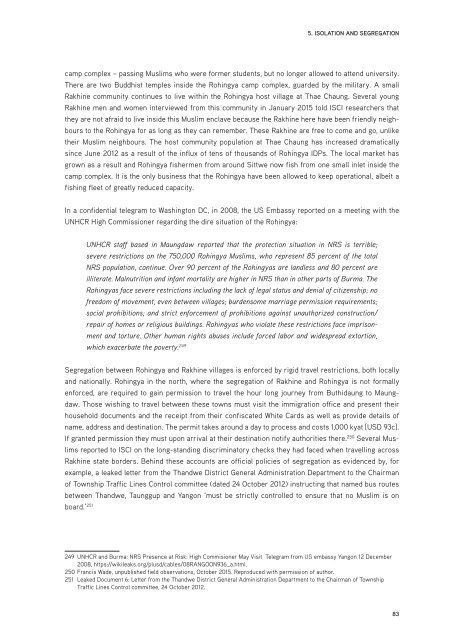You also want an ePaper? Increase the reach of your titles
YUMPU automatically turns print PDFs into web optimized ePapers that Google loves.
5. ISOLATION AND SEGREGATION<br />
camp complex – passing Muslims who were former students, but no longer allowed to attend university.<br />
There are two Buddhist temples inside the Rohingya camp complex, guarded by the military. A small<br />
Rakhine community continues to live within the Rohingya host village at Thae Chaung. Several young<br />
Rakhine men and women interviewed from this community in January 2015 told ISCI researchers that<br />
they are not afraid to live inside this Muslim enclave because the Rakhine here have been friendly neighbours<br />
to the Rohingya for as long as they can remember. These Rakhine are free to come and go, unlike<br />
their Muslim neighbours. The host community population at Thae Chaung has increased dramatically<br />
since June 2012 as a result of the influx of tens of thousands of Rohingya IDPs. The local market has<br />
grown as a result and Rohingya fishermen from around Sittwe now fish from one small inlet inside the<br />
camp complex. It is the only business that the Rohingya have been allowed to keep operational, albeit a<br />
fishing fleet of greatly reduced capacity.<br />
In a confidential telegram to Washington DC, in 2008, the US Embassy reported on a meeting with the<br />
UNHCR High Commissioner regarding the dire situation of the Rohingya:<br />
UNHCR staff based in Maungdaw reported that the protection situation in NRS is terrible;<br />
severe restrictions on the 750,000 Rohingya Muslims, who represent 85 percent of the total<br />
NRS population, continue. Over 90 percent of the Rohingyas are landless and 80 percent are<br />
illiterate. Malnutrition and infant mortality are higher in NRS than in other parts of Burma. The<br />
Rohingyas face severe restrictions including the lack of legal status and denial of citizenship; no<br />
freedom of movement, even between villages; burdensome marriage permission requirements;<br />
social prohibitions; and strict enforcement of prohibitions against unauthorized construction/<br />
repair of homes or religious buildings. Rohingyas who violate these restrictions face imprisonment<br />
and torture. Other human rights abuses include forced labor and widespread extortion,<br />
which exacerbate the poverty. 249<br />
Segregation between Rohingya and Rakhine villages is enforced by rigid travel restrictions, both locally<br />
and nationally. Rohingya in the north, where the segregation of Rakhine and Rohingya is not formally<br />
enforced, are required to gain permission to travel the hour long journey from Buthidaung to Maungdaw.<br />
Those wishing to travel between these towns must visit the immigration office and present their<br />
household documents and the receipt from their confiscated White Cards as well as provide details of<br />
name, address and destination. The permit takes around a day to process and costs 1,000 kyat [USD 93c].<br />
If granted permission they must upon arrival at their destination notify authorities there. 250 Several Muslims<br />
reported to ISCI on the long-standing discriminatory checks they had faced when travelling across<br />
Rakhine state borders. Behind these accounts are official policies of segregation as evidenced by, for<br />
example, a leaked letter from the Thandwe District General Administration Department to the Chairman<br />
of Township Traffic Lines Control committee (dated 24 October 2012) instructing that named bus routes<br />
between Thandwe, Taunggup and Yangon ‘must be strictly controlled to ensure that no Muslim is on<br />
board.’ 251<br />
249 UNHCR and Burma: NRS Presence at Risk: High Commisioner May Visit Telegram from US embassy Yangon 12 December<br />
2008, https://wikileaks.org/plusd/cables/08RANGOON936_a.html.<br />
250 Francis Wade, unpublished field observations, October 2015. Reproduced with permission of author.<br />
251 Leaked Document 6: Letter from the Thandwe District General Administration Department to the Chairman of Township<br />
Traffic Lines Control committee, 24 October 2012.<br />
83



